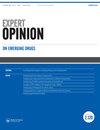评估乙型肝炎治疗药物治疗的发展前景:II期临床试验中药物的关注
IF 2.7
3区 医学
Q2 PHARMACOLOGY & PHARMACY
引用次数: 5
摘要
摘要引言功能性治愈,定义为持续的HBsAg血清清除,与慢性乙型肝炎(CHB)的良好结局有关。虽然核苷类似物(NAs)在抑制HBV复制方面是有效的,但NAs不能以高比率诱导功能性治愈。目前正在开发一系列旨在诱导功能性治愈的新型HBV抗病毒药物。涵盖的领域本文涵盖了已进入II期试验的新型乙型肝炎病毒(HBV)抗病毒药物。所涵盖的病毒导向剂包括进入抑制剂、转录抑制剂、RNA消音器、核心蛋白变构调节剂、非竞争性聚合酶抑制剂和病毒蛋白输出抑制剂。涵盖的免疫调节剂包括先天免疫刺激剂、T细胞调节剂、治疗性疫苗和单克隆抗体。还将讨论未来的发展方向。专家意见在新型HBV抗病毒药物中,RNA消音器、病毒蛋白输出抑制剂(含聚乙二醇干扰素)和进入抑制剂(含PEG干扰素)似乎对抑制HBsAg有效,甚至可能诱导功能性治愈。其他病毒靶向剂对HBV DNA、HBsAg、HBeAg和HBcrAg有不同的影响。免疫调节剂对HBsAg有适度的作用,但可能在联合治疗中发挥重要作用。即将进行的试验将回答关于理想给药、长期药物效果和联合方案疗效的重要问题。本文章由计算机程序翻译,如有差异,请以英文原文为准。
Assessing the developing pharmacotherapeutic landscape in hepatitis B treatment: a spotlight on drugs in phase II clinical trials
ABSTRACT Introduction Functional cure, defined as sustained HBsAg seroclearance, is associated with favorable outcomes in chronic hepatitis B (CHB). While nucleos(t)ide analogues (NAs) are effective in suppressing HBV replication, NAs are unable to induce functional cure at high rates. A range of novel HBV antivirals, aiming to induce functional cure, are currently under development. Areas covered This article covered novel hepatitis B virus (HBV) antivirals that have entered phase II trials. Virus-directing agents covered include entry inhibitors, transcription inhibitors, RNA silencers, core protein allosteric modulators, noncompetitive polymerase inhibitors, and viral protein export inhibitors. Immunomodulators covered include innate immune stimulators, T-cell modulators, therapeutic vaccines, and monoclonal antibodies. Upcoming developmental directions would also be discussed. Expert opinion Among novel HBV antivirals, RNA silencers, viral protein export inhibitors (with pegylated interferon), and entry inhibitors (with pegylated interferon) appear to be effective in suppressing HBsAg and may even induce functional cure. The other virus-targeting agents have variable effects on HBV DNA, HBsAg, HBeAg, and HBcrAg. Immunomodulators have modest effects on HBsAg but may have important roles in combination therapy. Upcoming trials will answer important questions on ideal dosing, long-term drug effects, and efficacy of combination regimens.
求助全文
通过发布文献求助,成功后即可免费获取论文全文。
去求助
来源期刊
CiteScore
5.90
自引率
0.00%
发文量
28
审稿时长
>12 weeks
期刊介绍:
Expert Opinion on Emerging Drugs (ISSN 1472-8214 [print], 1744-7623 [electronic]) is a MEDLINE-indexed, peer-reviewed, international journal publishing structured reviews on Phase II and Phase III drugs/drug classes emerging onto the market across all therapy areas, providing expert opinion on their potential impact on the current management of specific diseases.

 求助内容:
求助内容: 应助结果提醒方式:
应助结果提醒方式:


